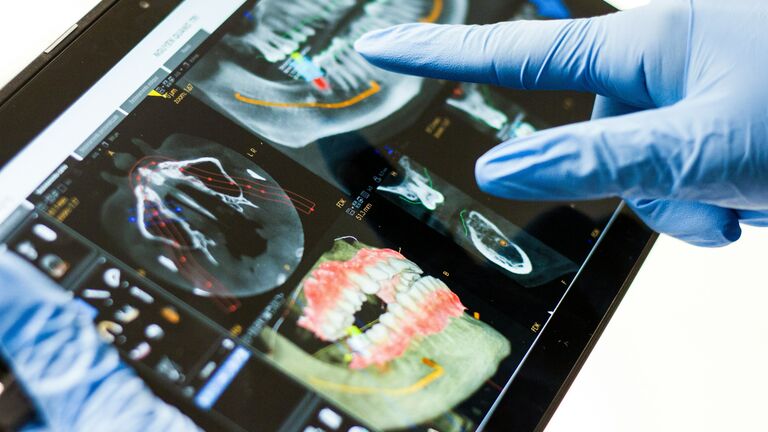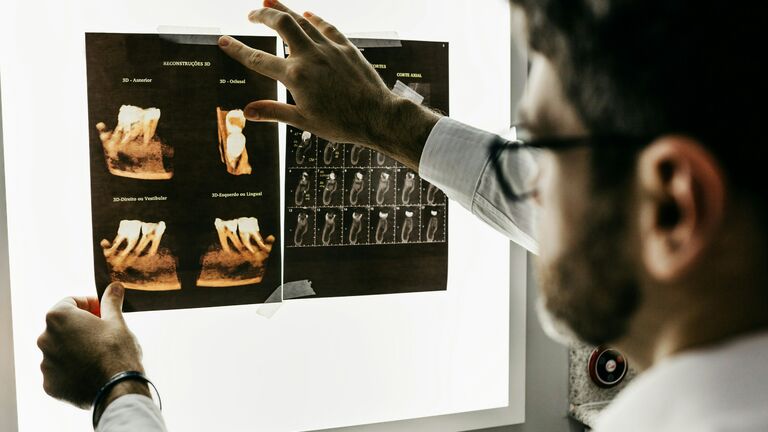
Understanding the Dental Implant Procedure
The dental implant procedure can be very difficult to understand. With some dental practices offering “dental implants in a day”, and others saying it will take months or even years to complete the treatment, it can be difficult to know who to trust and what to believe.
The important thing to remember about the dental implant procedure is that it is unique to each patient. This is because healing times are different for everyone, and we can’t move forward to the next stage in the treatment plan until the patient is sufficiently healed.
So, while we can give a general idea of how long treatment will take and what will be included in the dental implant procedure, it’s important to remember that it could be different for you.

What are the steps in an implant procedure?
The general steps in the dental implant procedure are as follows:
Step one – extractions
If you are removing teeth to replace them with dental implants, this will start with extractions. Some patients can have dental implants placed on the same day as their extractions. Others will need to wait for the site to heal before the implants can be placed.
Step two – placing the implant
The next step in the dental implant procedure is to place the implant in the jaw. This involves exposing the jawbone and then drilling a small pocket. The implant is placed in this pocket and then the gum is sealed above it. The jawbone will then fuse with the implant to create a strong anchor.
Step three – placing the abutment
Once the jawbone has fused with the implant, we then expose the top of the implant to attach the healing abutment. This part sits above the gum line, so we need to contour the gum to create a natural looking finish. We’ll leave this to heal again, but this will take less time than the implant healing time.
Step four – placing the restoration
The final step in the dental implant process is to place the crown. This attaches permanently to the abutment and only a dentist can remove it. There are other options available, for example if you choose implant retained dentures. These may be removable and are held in place with magnetic snaps.

How does the implant procedure differ for different types of implants?
There are some variations in the treatment plan, depending on the type of dental implants you choose.
For example, with All-On-4 dental implants, these are longer implants that are placed at an angle. The angle and length of the implants allows us to place a load-bearing denture on the same day. Here are some of the key differences with different types of dental implant procedures:
All On 4 Dental implants
As mentioned above, this treatment plan is different as we can place a load-bearing implant on the same day. This treatment uses longer, angled implants, which do not need to heal before they can support a denture.
Implant retained dentures
With this treatment plan, you will be able to choose between removable and fixed dentures. This won’t change the treatment course, but you may need to add an additional step to the plan. You may be fitted with a temporary denture while your abutment placement heals, and then you will get a permanent denture when this healing process is complete.
Single versus multiple implants
With All-On-4 and implant retained dentures, you will have multiple dental implants that are supporting the full arch restoration. In general, it takes longer for multiple dental implants to heal than a single dental implant. This is because of the toll it takes on your body. The process for a single dental implant will be quicker than multiple dental implants.
Upper jaw versus lower jaw
Implants placed in the upper jaw typically take a little longer to heal because the bone is softer. The lower jaw is denser, which typically helps to speed up healing times. As mentioned above, everyone heals at different rates. Your own body's healing process will determine when you are ready for the next stage in the dental implant procedure. Rushing the process can lead to implant failure.

What can make the dental implant procedure longer?
There are a few factors that might make the dental implant procedure take longer.
If you need a bone graft to increase the bone density in your jaw, this will extend the overall treatment time. You will need to factor in time for the bone graft procedure and then healing times following the bone graft.
Your healing rate. Everyone heals at a different speed. Older people may find that their bodies heal slower than when they were younger. If your immune system is compromised during the healing process, you might find that your body is slower to heal.
Smoking during the healing process puts you at risk of implant failure. This is because smoking restricts blood flow to your gums, which makes it difficult for your body to heal. We always recommend that you quit smoking before you begin dental implant treatment.
How long will my dental implants hurt?
You can expect some discomfort after the procedure, but this should be easily managed with over the counter medication such as ibuprofen or paracetamol. In general, the healing process is similar to that of an extraction. This means that you should experience some discomfort for around 7-14 days after the initial procedure.
After placing the implant, it might take a few days to adjust to the change in your bite. If you are still struggling after a few days, return to the practice, as it could mean that the crown is not right for your mouth.
Curious about this treatment?
If you’re ready to learn more about dental implant treatment with Armytage Dental Practice, get in touch to arrange your consultation today.
Call us to make an appointment
We are accepting new patients and our team are here to help
Call us now
Teeth Whitening Offer £270
Teeth Whitening and Hygiene offer for £270 until end of April 2021.

Invisalign FREE teeth whitening
Invisalign FREE teeth whitening
02.05.2024
Signs of a Failed Dental Implant

Call us to make an appointment
We are accepting new patients and our team are here to help

